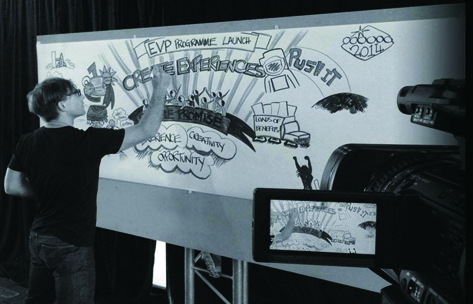
Have you noticed that things are a little different? Business as usual is not the new normal. Things aren’t just changing. They’re changing rapidly. Disruption is everywhere.
 The skills needed to thrive in a new workforce are completely different to ten years ago. The World Economic Forum lists creativity as the third most important skill that will be needed to thrive in 2020. The need to constantly innovate has moved from nice to have, to essential.
The skills needed to thrive in a new workforce are completely different to ten years ago. The World Economic Forum lists creativity as the third most important skill that will be needed to thrive in 2020. The need to constantly innovate has moved from nice to have, to essential.
As the world around us changes, how do you constantly challenge your team to shift their thinking? How do you motivate and reward for creativity, imagination, experimentation and innovation? How do you reward for those skills needed for your team to thrive?
Author Daniel Pink gives a great TED talk on the power of motivation, and how this has changed over the last 40-50 years as the role of work has shifted. As we’ve moved from the industrialised age, our work no longer involves repeating the same task over and over. The carrot-and-stick type approach might work OK in linear “if you do x then y will happen” work, but it simply isn’t suited to a culture of innovation.
As such, the rewards and recognition for a culture of innovation need to be a little different from the standard “hit target/get reward” or “make a thousand widgets/get a bigger Christmas party” type incentives.
If you recognise and reward the great people in your team for innovative behaviour, you’ll start to build a culture of innovation. And then you’ll start to turbocharge everything.
As your starting point, recognise and reward:
• Team members who constantly pitch ideas. No one has a mortgage on ideas and you need loads of them;
• Networking and collaboration between diverse teams and employees who take an idea further, rather than kill it;
• Fresh insight and research into customers’ problems. Innovation starts with problems, not ideas;
• Teams that take a different path in trying to solve those problems;
• Ideas that didn’t work but produced learning to be used elsewhere (yes, a little fail!);
• People who have taken on an interesting hobby or something outside of work to shift their perspective;
• A team member who does something new to bring a fresh approach and new thinking into your company;
• Transparency and honesty. Great ideas happen when opposing opinions bump heads without people getting defensive.
Highly complex, conceptual and creative work is the new normal. If you want to have an innovative culture and thrive, become innovative with your rewards as well, and shift your thinking around motivation.
Simon Banks is an author, keynote speaker on Creativity and Innovation and conference MC. He’s the director of creative training company VisualFunk, and his first book, A Thousand Little Lightbulbs, is out now


